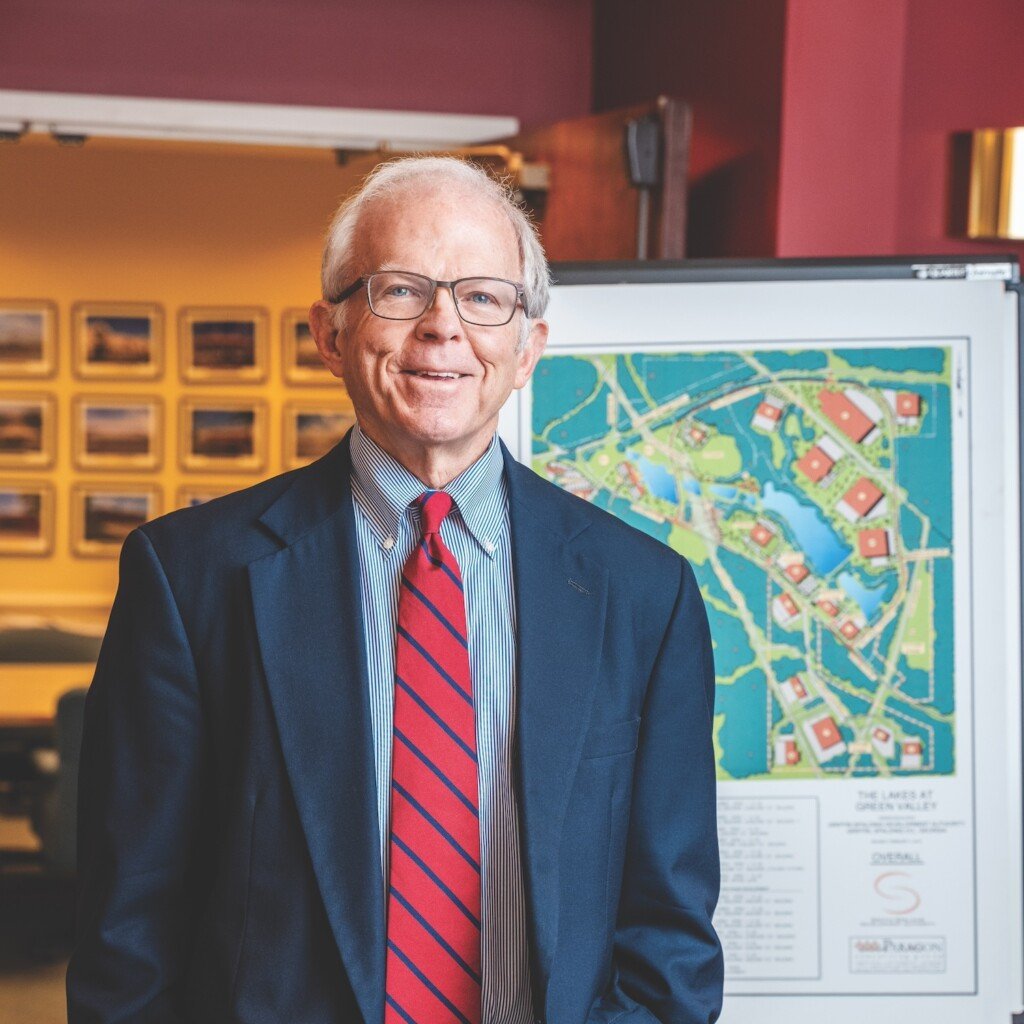Newnan | Coweta County: Town and Country
Growth, Workforce, Healthcare
 Founded in 1825, Coweta County was at one time one of the wealthiest communities in the country due to its manufacturing industry. That same industry is helping it thrive today. The county, located about 40 miles southwest of Atlanta, is home to approximately 153,000 people who benefit from small-town life with the conveniences of being part of the Metro Atlanta area.
Founded in 1825, Coweta County was at one time one of the wealthiest communities in the country due to its manufacturing industry. That same industry is helping it thrive today. The county, located about 40 miles southwest of Atlanta, is home to approximately 153,000 people who benefit from small-town life with the conveniences of being part of the Metro Atlanta area.

Attracting Manufacturers: County Administrator Michael Fouts, at the Coweta County Probate Court. | Photo credit: Nathan Leduc
Manufacturers have long been drawn to the county for several reasons: convenient access to an interstate, nearby Hartsfield-Jackson International Airport, a trained workforce, and favorable economic circumstances, including affordable real estate.
From tires and ATVs to doorframes and water tanks, dozens of products are made in Coweta County today. Its economy is driven by 23 companies from 15 different countries, 10 of which are headquartered there. In fact, one-third of Coweta’s large manufacturing workforce is employed by these companies.
Economic Development
One of the biggest companies is Hitachi Construction Machinery Americas, which manufactures construction equipment and mining equipment. It expanded its current location into its regional headquarters, adding 92 jobs and $33 million in capital investment. The new space will span more than 88,000 square feet. “To have somebody that’s been successful in your community and then double down on that feels like you’re doing what you’re supposed to be doing,” says County Administrator Michael Fouts. “We’re really excited the average annual wage for those [workers is] $111,000.”

Charming Community: Sarah Jacobs, Coweta County Economic Development Authority president, at FREYR. | Photo credit: Nathan Leduc
Korean-based auto-parts supplier Hyundai Industrial announced in November that it’s making a $24 million investment to retrofit an existing building in Coweta County, creating 100 jobs. The supplier to Hyundai and Kia specializes in manufacturing car seats, arm rests and head rests for OEMs, including the Hyundai Metaplant in Bryan County. Another recent investor to the area is Norwegian company FREYR Battery, a developer of next-generation batteries for the energy storage market. “They’re helping to put Georgia on the map as part of the ‘Battery Belt’” says Fouts. “Coweta’s proximity to Atlanta, labor market, and local education partnerships have positioned our community well for attracting more advanced manufacturing investments like FREYR,” he says, adding the company will create more than 720 new jobs over the next six years.
FREYR plans to spend $1.7 billion on the first phase of what it calls its “Giga America” factory, with a later expansion that could include features like solar parks with storage modules and materials processing, which would bring the total investment to nearly $2.6 billion. These are “lifetime career” jobs that will pay an average salary of $60,000 and don’t require four years of education, notes Coweta County Economic Development Authority President Sarah Jacobs, adding that these wages are 127% of the average Coweta County wage.

Successful Venture: Employees of Hitachi Construction Machinery Americas celebrate the grand opening of its new regional headquarters in Newnan earlier this year. | Photo credit: contributed
President and CEO of the Newnan-Coweta Chamber Candace Boothby says growth in the region has impacted paychecks. “I was at Buffalo Rock recently, which is our Pepsi distributor, and I was a little surprised when they told me that their starting salary was $52,000,” she says. “All of our companies are experiencing growth.”
Boothby says the Cargill Newnan protein processing plant, at one time the largest employer in Coweta, is adding 120 employees to its facility. Cargill provides beef and other protein products to grocers.
Winpak Films is also increasing its footprint, investing $890,000 in 44 acres of property adjacent to its existing facility in Senoia. Winpak manufactures and distributes packaging materials and machines, primarily used for the protection of perishable foods, beverages, pharmaceuticals and medical and personal care. The facility in Coweta focuses on film packaging.
Education Bolsters Workforce
Good schools, accessible cancer treatment and a myriad of tourism avenues are other significant drivers of what puts Newnan-Coweta on the map.
As the seventh largest university in the state, the University of West Georgia (UWG) is a big presence throughout western Georgia. University President Brendan Kelly says various companies, organizations, school districts and hospitals rely on UWG and its graduates. “We are supplying the No. 1 thing they are looking for, and that is talent,” he says, adding that UWG looks to the surrounding industry to discover its needs so the university can deliver the desired results.
“There is no greater success than a student who comes to a university looking for a life-shaping experience, but that includes transition [into] the industry,” Kelly says. “And if we can start that process before they graduate with talent pipelines, internships [and] externships that connect into industry, so [students] get a chance to be acclimated to the culture of a company … we create more value for industry.”
One of the university’s most popular areas of study is computing. Kelly says the school has built a suite of programs in computing, cybersecurity and applied business analytics that are some of the fastest growing at the institution. “Those were built with [input from] industry and that’s the uniqueness,” Kelly says “We literally sat down with [people from] 20 tech companies throughout the region and [asked]: ‘Exactly what do you need to receive, from a computing perspective?’” Kelly says these academic programs, which are built in concert with industry, are a great point of distinction for UWG, and that students who graduate in such programs often earn six-figure salaries.

Supplying Talent: Brendan Kelly, president of the University of West Georgia. | Photo credit: contributed
Coweta County also is home to West Georgia Technical College (WGTC), which covers seven counties and has five full-service campuses and several instructional sites. President Julie Post says the school’s mission is to provide affordable education for its students.
“We have over 100 programs that someone can take at … $100 a credit hour to pave the way to over 100 careers, most of which will earn far more than 50 grand a year in two years or less. So that makes us very unique,” she says. WGTC offers programs of study ranging from healthcare and trades to technology and transportation. It also has public safety programs, business and IT. “We cover the gamut based on what the industry in our area needs,” says Post. “Every single program that we offer is aligned specifically with a career. So we know that when a student completes [a program] with us, there’s a job.”
Post notes that WGTC stacks its credentials. In other words, a student might begin a certificate that’s just a few courses but can then build that into an associate degree – meaning students can take classes while they get started on a career. “They can maybe go to work, and they continue to go to college with us and build upon that career, giving themselves continued upward mobility,” Post says.

Affordable Education: Julie Post, president of West Georgia Technical College, on the Coweta campus. | Photo credit Nathan Leduc
Healthcare programs continue to be the biggest draw for students while computer science comes in a strong second, according to Post. Because Coweta is largely a manufacturing area, the school is looking to expand the precision manufacturing and maintenance program. “We’re working on trying to find ways to make precision manufacturing sexy because the industry needs students to be interested in that,” she says. “[Manufacturing is] not what it used to be. It’s a clean environment, and there’s tons of opportunity for growth, and there is a lot of high-tech industry out there that needs that employee base.”
Post says WGTC puts 98% of its graduates to work in businesses that need them. And about 87% of those graduates are placed in the field in which they studied.
Coweta’s Central Educational Center (CEC) is a publicly funded charter college and career academy that uses collaboration between education, business and government to help high school students develop career-based skills.
“It’s a joint venture that combines the engagement of business with the educational expertise and programming of our technical college system and our local school district,” says CEO Mark Whitlock. He says the idea is to help students become more highly skilled by the age of 18 instead of waiting until they’re 28, which is the average age of technical or community college students in the U.S.

Cutting-Edge Treatments: City of Hope Cancer Center Atlanta, in Coweta County. | Photo credit: contributed
The CEC, now in its 24th year in Newnan, is the first of more than 50 college and career academies across Georgia, after the General Assembly passed legislation in 2011 to certify the program and provided an additional investment of more than $160 million.
What this means for a student at CEC is that by the time they graduate from high school, they have received technical college certificates of credit. “It shows high-skill, higher-wage career paths,” Whitlock says. “We’ve had students who’ve [completed] that program, and they … are making at least $40,000 a year. Some of them are now in their early 20s and they’re getting close to six figures, with no college debt and working in local jobs.”
Beacon of Hope
Newnan is also home to City of Hope Cancer Center Atlanta, a cancer treatment hospital with impressive backing. The nonprofit City of Hope is known nationally for its National Cancer Institute-designated comprehensive cancer center in California, the highest designation a cancer center can achieve. It acquired the Newnan hospital when it purchased Cancer Treatment Centers of America in 2022, providing patients with access to advanced research and care.

Drawing Tourists: Heather Daniel, president and CEO of Explore Newnan-Coweta. | Photo credit: contributed
“What makes us unique is that everything that we’re offering from a service line perspective is under one roof,” says Patrick Brown, City of Hope Atlanta’s vice president of business development. “We’re doing things like chemotherapy, radiation [and] surgical oncology. We also combine those with things like naturopathic medicine, clinical dietitians, mind-body medicine [and] spiritual support. Patients get that whole person care while they’re here.”
Roughly 60% of City of Hope’s patients come from Georgia, according to Brown, who says the facility essentially serves as the oncology arm for many rural hospitals in Georgia, Alabama and other surrounding states that don’t have cancer programs.
City of Hope offers cutting-edge treatments for cancer, including bone marrow transplantation (called hematopoietic stem cell transplantation) and CAR-T therapy, a type of treatment that uses a patient’s own immune system to kill cancer cells. “This program offers leading-edge blood cancer treatment options to our cancer patients,” Dr. Leslie Popplewell, the medical director at City of Hope Atlanta’s Hematology and Blood and Marrow Transplant department, said in an email. “We have the capability to treat a wide array of blood cancers … [through] innovative technologies that use a patient’s own cells or immune system to treat cancer.”
“Establishing this program is a critical milestone for City of Hope … and a life-saving milestone for Georgians seeking treatment for these challenging diseases,” says Brown.
While both Georgia’s cancer incidence rate (the number of new cases reported) and its cancer mortality rate are higher than the national average, “the death rate of all cancers nationwide has been on a steady decline over the past 30 years,” says Brown. “We are seeing an increase in younger adults being diagnosed with cancer, especially colon cancer, but that’s why screening efforts and community health education are so important.”
Movies, Skating and Trails

Defying Gravity: C.J. Smith Skate Park in Newnan attracts everyone from novices to professionals. | Photo credit: contributed
Tourism is a huge piece of what inspired Explore Newnan-Coweta’s tagline, “discover your curious,” and there are plenty of options to do so.
“Our tagline encompasses that fact by conveying you can choose your own adventure,” says Heather Daniel, president and CEO of Explore Newnan-Coweta. “We appeal to a variety [of people] from families and young couples to retirees and film fanatics. We see families visiting the [Chattahoochee Bend] State Park and exploring our historic downtowns as well as day-trippers who want to feel as though they are strolling through a Norman Rockwell painting for the afternoon.”
Newnan’s historic downtown is a draw for tourists. “It’s our unique mix of businesses … that allows for the vibrancy. Of course, it is also just a nice, inviting and beautiful place to come,” says Abigail Strickland, Main Street manager, of downtown Newnan. She says the area is booming so much that out of over 150 business sites in the downtown area, there are virtually no vacancies.
“Our ultimate goal is to make sure the community retains what makes it a charming community,” says the Development Authority’s Jacobs. “But you know, you’re either growing or you’re dying. You can’t ever stop. Right now, we want controlled growth,” she says.
Even those who haven’t been to Coweta County may be familiar with the area for its film industry, thanks to The Walking Dead. And earlier this spring Kevin Bacon filmed a series in Senoia for Amazon entitled The Bondsman, a horror action show in which Bacon portrays a backwoods bounty hunter who comes back from the dead with an unexpected second chance at life, love, and a nearly forgotten music career – only to find that his old job now has a demonic new twist.
Another attraction is bringing a different crowd to the area. “We have probably the largest, best skate park in the Southeast,” says Cleatus Phillips, Newnan city manager. “We have professionals who come. We have people training for the Olympics. We have people coming from out of state for our park … We even integrated this huge adult slide into a hillside. It’s amazing!”

Amazing Amenities: Newnan’s LINC Trail winds its way into the downtown district, far left, and Cleatus Phillips, Newnan City Manager, left. | Photo credit: contributed
Newnan also has developed a bike and pedestrian trail system known as the LINC. The plan is to eventually be a 26-mile network; right now, only five miles have been completed. “Lots of people love to just get outdoors and … be in nature and yet you’re still right in the middle of the metro area as well. So that’s a great part of all that we have to do here,” says Explore Newnan-Coweta’s Daniel.
“Our trail system actually comes into our downtown district,” says Strickland. “It stops and then it’ll pick back up. It goes from one of our larger neighborhoods out on the east side of town, and it comes all the way into downtown district [where it] stops currently [although an extension is planned]. So when you get off your bike you have this area that you can come and shop and dine and enjoy and take a rest. Then you can hop back on and go to another part of the county.”
Newnan-Coweta is prospering on many levels. Its population continues to grow, with numerous amenities for its residents. Manufacturing and other industry investments provide a strong economy, which is the underpinning for the 446-square-mile region. Healthcare and education are cutting-edge commodities, while recreation activities are abundant.
“Without feeling like a suburb of Atlanta, it really feels like it’s kind of this oasis of small-town charm,” says Jacobs. “And I don’t think you get that a lot of places with still having all those amenities of a big city.”
Local Flavor
Historic Train Depot

Popular Venue: Robert Hancock and his wife Candace bought the train depot in the 1990s, refurbished it and donated it to Newnan-Coweta Historical Society, now the Newnan-Coweta History Center. | Photo credit: Nathan Leduc
The Newnan-Coweta History’s Center’s Historic Train Depot is a popular event venue – not only because of its brick walls, original wooden beams and charming layout, but thanks to its nearly 200-year history. Home to the freight and passenger depot for the Atlanta & West Point Railroad in the 1850s, the site helped shape the development of Newnan. As a prime location for the transportation of goods, it became a center for commerce in the area.
During the Civil War, trains moved troops and supplies to the front lines via the depot. And in July of 1864, it was the site of a conflict that broke out after a Union raiding party encountered Confederate troops detained at the depot because of rail damage. The fighting was followed by a two-day battle south of Newnan at Brown’s Mill, won by Confederate soldiers.
Roughly a century later, the Man O’ War, a deluxe passenger train with service from Atlanta to Columbus, made its final stop in Newnan on May 16, 1970. Eventually the building fell into disrepair, leading to the demolition of the passenger section and freight platform.
In the mid-1990s, Robert and Candace Hancock purchased the remaining portion of the building and donated it to the Newnan-Coweta Historical Society, now the Newnan-Coweta History Center. Hancock says he and his wife are history lovers and they hated to see what had become of one of the oldest buildings in the city. “I think we paid about $60,000 for the property and spent about $30,000 to $40,000 to refurbish it,” he says.
In 2000, with renewed interest in the Battle of Brown’s Mill, local leaders formed a plan to commemorate the site and use the depot as an educational facility. The Newnan-Coweta History Center, with the support of Georgia Rep. Lynn Smith, received a grant from the governor’s office to restore the building to house exhibits of the Brown’s Mill Battlefield, now on the National Register of Historic Places. For security reasons, the Civil War artifacts and artwork were later moved to the History Center’s Museum, the McRitchie-Hollis Museum, where they are on display and properly protected.
The History Center now showcases the depot as a premiere event venue. The inside space can accommodate up to 125 people for a sit-down meal and dancing, and there is an outdoor patio that overlooks the train tracks. Other ideas for the site are in the works. “There are plans to install new educational exhibits about the railroad and the Browns Mill battle that would include film, text panels, an interactive digital display, and in-person and digital tours,” says Larisa Scott, executive director of the History Center. She says the building requires monthly visits from a handyman who specializes in historic properties, and the History Center pays for all of the upkeep with no expense to taxpayers. – Kristen Soles McCrackin








